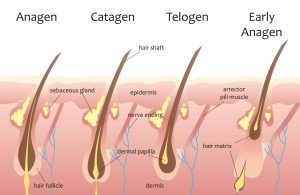 Hair growth is surprisingly complicated! Hair loss problems can occur at several stages in the development of hair, and it’s important to be aware of how and why these can occur.
Hair growth is surprisingly complicated! Hair loss problems can occur at several stages in the development of hair, and it’s important to be aware of how and why these can occur.
Hair starts growing by week 22 of a developing foetus. At this stage, the foetus has about 5 million hair follicles on the body – one million on the head and about one hundred thousand on the scalp. We don’t create any new hair follicles at any point after this, unfortunately!
The Structure Of Hair
Hair is made up of a protein known as Keratin which also forms the protective outer layer of our skin, and is the primary building blocks in fingernails and toe nails.
Each strand of hair has three layers – the cuticle, the cortex and the medulla which protect the growing hair shaft.
The cuticle is the outer layer of the strand whose job it is to protect the cortex which contains melanin (which gives your hair its colour). The medulla is the innermost layer of the hair and functions like a marrow. The hair shaft, made of dead proteins is what is actually visible as normal hair.
The hair follicle is a tunnel like segment that extends down into the skin. The follicle is protected by two sheaths – an inner and outer sheath. The inner sheath ends below the opening of a sebaceous (oil) gland which produces sebum – which protects hair and skin. The base of the follicle is connected to capillaries that provide blood, oxygen and nutrients to the cells.
The average Caucasian person has 5 million hairs of which 100,000 to 150,000 are on the head. This hair grows about 0.3 to 0.4 mm per day and roughly 15 cm per year.
The Cycle of Hair Growth
There are three main stages of hair growth, being the Anagen, Catagen and Telogen phase. Disruptions to any of these stages, caused by genetic or environmental pressures can unfortunately cause hair loss.
Anagen
The Anagen phase is the growth phase of the hair in which hair grows about 1cm every 28 days, and stays in this phase for about two to six years, depending on your genetic make-up.
Catagen
The Catagen phase usually lasts for about two to three weeks and signals the end of the active growth of hair. This phase is a transitional stage between the growth and resting phase and about 3% of all hairs exist in this phase at any time.
Telogen
Telogen is the resting phase of the hair growth stage and about 6% to 8% of all hairs remain in this stage at one time, lasting for about 100 days. We shed about 25 to 100 Telogen hairs each day during this phase, so mild hair loss shouldn’t be cause for concern.
When balding, most of our normal hair gets replaced with much smaller, finer, ‘vellus’ hairs. This happens when the follicle has been affected by ageing or has suffered physical damage o from internal or external factors.
What Can Affect Hair Growth?
Hair growth is a complex set of interacting elements, but changes to any of the following can disrupt healthy hair growth cycles:
- Stress: When under extreme stress, the hair growth cycle can be disrupted and prematurely advanced to the telogen phase, leading to thinning and loss.
- Nutrition and Minerals: Poor nutrition and eating habits can lead to deficiencies in key minerals needed for healthy skin and hair.
- Hormones: Dihydrotestosterone, a bi-product of Testosterone in the body, is thought to bind to hair follicles and cause them to prematurely shrink. This affects both men and women.
- Genetics: A family history of baldness is more likely to predict hair loss than anything else. The purpose of this trait is still being investigated.
- Medications: Many drugs can induce early hair loss, depending on the strength and dosage of the
- Age: Follicles shrink as we grow older, and everyone will see a volume reduction as they age.
Contact Advanced Hair Studio Australia To Get Your Hair Back Now
Over 1 million people around the world have had their lives changed by our treatments. We know they work because we have seen it first hand, and we have hundreds of thousands of happy customers who are prepared to back our expertise.
Restore your confidence today:
- Call Advanced Hair Studio on (852) 2521 9663
- Book A Consultation With A Hairloss Specialist


